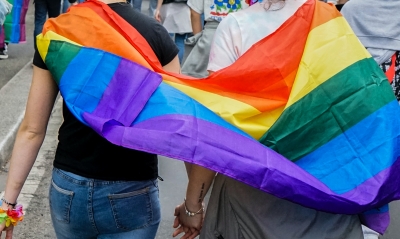New Delhi, April 19 : In the Special Marriage Act (SMA), 1954, wherever “husband” and “wife” is used, make it gender neutral by using “spouse”, while “man” and “woman” should be substituted by “person”, the Supreme Court was told on Wednesday during the hearing on petitions seeking legal sanction to same-sex marriages.
Senior advocate Mukul Rohatgi, representing some petitioners, submitted before a five-judge bench headed by Chief Justice of India D.Y.Chandrachud that in the Special Marriage Act (SMA), insisted that a large part of problem will be solved through this interpretation.
Rohtagi discussed at length provisions of the SMA to interpret it to include LGBTQAI+ community within its scope and granting the right of solemnisation of their marriage within its provisions.
Thereafter, he read multiple provisions including Sections 2, 4, 22, 27, 36 and 37 of the SMA to propose a workability of solemnisation and/or registration of marriages of same-sex couples under thereto.
He stressed that the fundamental rights guaranteed in the Constitution were for all individuals, heterosexual or queer, and added that there was no reason why they should be denied the right to marriage.
“We will not be treated as lesser mortals and there will be full enjoyment of the right to life.I require beyond the badge that I’m married.I also want the positive and affirmative consequences of a valid marriage.
Remove the dogma, remove the stigma,” he said, adding that the state must accept it gracefully.
Rohatgi contended that his clients want a declaration that “we have a right to marry, that right will be recognised by the state and will be registered under Special Marriage Act.Once that happens, the society will accept us.that will be full and final assimilation”.
He also cited the recent order of Nepal’s Supreme Court recognising same-sex marriages.
The apex court had asked Nepal’s Ministry of Law and Justice to prepare an equal marriage law or amend existing laws to accommodate the principles of equal marriage.
Rohatgi further relied on the recent judgment, wherein the court held that the law must not be relied upon to the disadvantage families which are different from traditional ones.
He wrapped up his arguments and senior advocate A.M.Singhvi started with his submissions in the matter.
Rohatgi was assisted by senior advocate Saurabh Kirpal, Dr.Maneka Guruswamy, Arundhati Katju and a team of advocates from Karanjawala & Co.
The arguments will continue after lunch at 2 p.m.
Earlier during the day, Solicitor General Tushar Mehta, representing the Centre, mentioned the affidavit filed by the government requesting the court to make states and union territories party in the case.
The Chief Justice said that is excellent, and added that since the government has informed every state about the matter, they are now not unaware of the proceedings.
The apex court declined to adjourn the hearing till completion of the Centre’s consultation process with states, and asked Rohatgi to proceed to argue on the merits of the case.
ss/
#spouse #person #Petitioners #marriages #Delhi #Delhi #New Delhi







